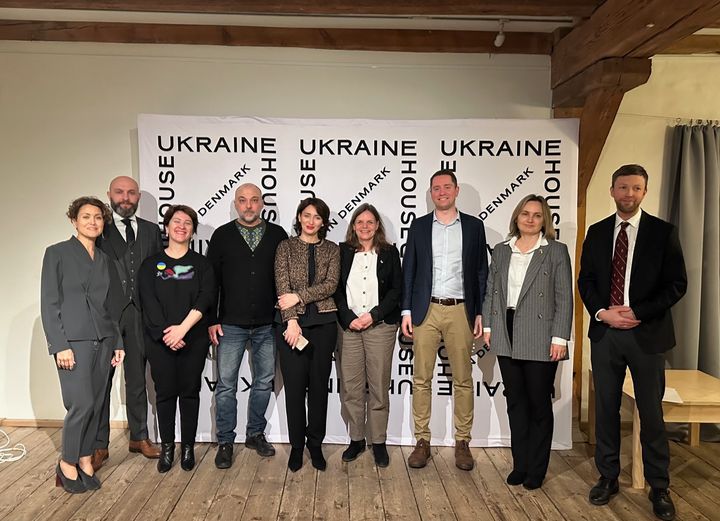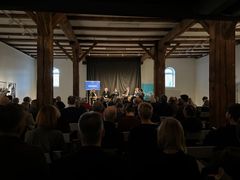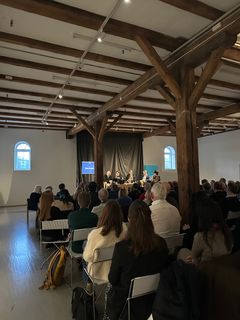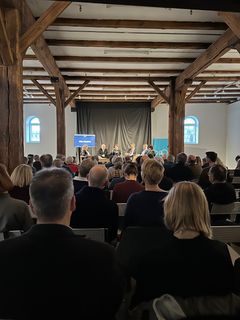The future of the freedom in the region depends on Ukraine's victory
12.3.2024 09:00:00 CET | Ukraine House in Denmark | Pressemeddelelse
"Being a Neighbor" to Russia panel discussion at the Ukraine House in Denmark brought together perspectives of Georgia, Lithuania, Moldova, Poland and Ukraine

28.02.2024 – To reflect on the reality of bordering Russia, the former illusions and current realizations, especially since February 24th 2022, Ukraine House in Denmark in cooperation with the Danish Foreign Policy Society has brought together 6 experts from 5 countries for a moderated discussion.
The Ukraine House was proud to host the panelists Eka Gigauri, Executive Director or Transparency International Georgia and Nino Evgenidze, Executive Director of Economic Policy Research Centre, representing Georgia, the renowned philosopher, phenomenologist Vakhtang Kebuladze representing Ukraine, Simas Celutka, an Assistant Professor at the Institute of International Relations and Political Science, at Vilnius University, representing Lithuania, His Excellency Antoni Falkowski, Ambassador of Poland to the Kingdom of Denmark, representing Poland, and Mihai Mogildea, Deputy Director of the Institute for European Policies and Reforms (IPRE), representing Moldova, joining online. The discussion was moderated by Charlotte Flindt Pedersen, the Managing Director of the Danish Foreign Policy Society. His Excellency Andrii Yanevskyi, the Ambassador of Ukraine to the Kingdom of Denmark delivered welcoming remarks.
The discussion attended by over 100 participants revolved around the future of the the countries in the neighborhood of Russia, the future of relations among them, rethinking the illusion the EU and Russia’s neighbors held around Russia’s policies of the last decades, the significance of the current Russia’s war of aggression against Ukraine and steps which need to be taken for further support Ukraine's victory in this war.
Key points made during the discussion in essence included:
Antoni Falkowski:
-
The Polish president of the years after the fall of the Iron Curtain, Lech Kaczyński warned the EU after the Russian invasion of Georgia that if the West does not respond harshly, Ukraine and the Baltic countries would be next. He was regarded as a radical back then, however he has now been proven to be right. A lesson that we must learn is to be less naive and more pragmatic in the partnerships with Russia, making proper risk assessments and listening to Russia’s neighboring countries.
-
For Poland and other neighbors of Russia, during the times of the Iron Curtain as well as now, the West is rather about values and than geography.
-
NATO and the EU provide safety for neighbors of Russia, living under the threat of attack, and that is why NATO expansion is so crucial
Nino Evgenidze:
-
Ceasefire and peace with Russia is not an option. In 2008, Georgia had negotiated a peace with Russia after the 5-day war of Russian aggression there but due to the actions of Russia’s occupant armed forces, Georgia has now lost more people during the 15 years of “peace” than in the 5-day war.
-
We cannot stay silent or turn away as crimes such as in Hostomel, Bucha, Mariupol are happening.
-
I do not see the freedom in the region if Ukraine is defeated.
Mihai Mogildea:
-
Russia uses corruption as a weapon in countries it wages war against.
-
Currently Russia is utilizing corruption to buy votes for Russian-leaning parties in the upcoming elections in Moldova
-
It is crucial to not be naive about Russia’s power, both soft power, related to disinformation, and military interests
Vakhtang Kebuladze:
-
It is important to imagine a peaceful world and the way it would look like. To give peace a chance. For that Russia must be defeated and its current shape will change.
-
In its current form Russia poses a threat not only to its neighbors or the EU but also Russians themselves, as they are being killed by the regime in the wars it wages internally and domestically.
-
Imperialism and colonialism is deeply seated in Russia’s history and dates back to pre-Soviet time. Russia must be defeated for the Russia people to be able to confront that reality.
-
The West placed a lot of hope in Navalnyi, however for Ukraine and Russia's neighbors, Russian liberals need to give up their imperialist mindsets. Otherwise, if the current Russian government is the enemy in our present, the Russian liberals may become the enemies in our collective future.
-
Russia regards the fall of the Soviet Union as a misunderstanding, not a liberation. They have not formed into a Russian political nation. This war is about finding a new identity for them.
Eka Gigauri:
-
Due to the lack of proper threat analysis, the West has been helping Russian oligarchs, directly and indirectly, to enjoy their life and hide their assets.
-
The Russian secret services have held a strong presence in the West and helped influence the illusions the collective West held of Russia
Simas Сelutka:
-
If the West actually has a will to rise up to the call of responsibility and stop the genocide happening in the 21st century Europe, it needs to learn from Ukrainians. Moral concepts such as self-sacrifice, courage, responsibility and freedom must regain their high status and genuine meaning in our mindset. We have to critically question Jurgen Habermas’s notion that Europe is defined by the “post-heroic mentality”. Otherwise, our weakness will prove to be our doom.
-
Critical situations - wars, occupations and revolutions - give us an opportunity to forge what Jan Patočka calls the “solidarity of the shaken”. The misalignment between the responses to the war in the Western and Central-Eastern Europe is an unfortunate indication that Western European countries have still not been shaken enough.
-
It is impossible to imagine or frame the suffering of the Russian opposition and the Ukrainian defenders as morally equivalent
-
We must invest more efforts into explaining the threat of Russian imperialism and colonialism in the West
-
It is tempting to ascribe war to one personality, Putin, however, the war is related to a much more deep seated problem, Russian imperialism, in which the whole of Russian people share, if not criminal, then moral responsibility.
Nøgleord
Kontakter
Maya ZakhovaikoCommunications Lead of Ukraine House in Denmark
press@ukrainehouse.comBilleder
Links
About Ukraine House in Denmark
Ukraine House in Denmark is the center of the Ukrainian culture in Denmark. It is home away from home for the Ukrainian community and a focal point for Danes who are in love with Ukraine or are getting to know the Ukrainian culture. It is an expression of trust and ambition to build a better world based on shared values and complementary perspectives.
A dedicated group of Ukrainians, project managers and educators, experienced in establishing of successful organisations in public diplomacy and community management, with social capital and access to cultural institutions in Denmark, Ukraine and the various Ukrainian centers of expertise in the diaspora, investing their time and efforts into executing projects, raising funds and ensuring results.
Følg pressemeddelelser fra Ukraine House in Denmark
Skriv dig op her, og modtag pressemeddelelser på e-mail. Indtast din e-mail, klik på abonner, og følg instruktionerne i den udsendte e-mail.
Flere pressemeddelelser fra Ukraine House in Denmark
Ukraine House in Denmark Opens “Voices of Dignity: Literature of Resistance” Exhibition – A Century of Ukrainian Cultural Defiance20.2.2026 10:49:04 CET | Presseinvitation
On February 23, 2026, Ukraine House in Denmark opens its new exhibition “Voices of Dignity: Literature of Resistance” — an exploration of how Ukrainian literature has functioned not only as art, but as an act of resistance across the twentieth and twenty-first centuries. It is a tribute to the Ukrainian literary voices who were persecuted or silenced under imperial and totalitarian regimes, those who were killed as a result of Russia’s full-scale invasion, and those who continue to write under the conditions of war.
Nobelprismodtager, danske stjerner og ukrainske forfattere markerer fireåret for krigen i Ukraine med storstilet solidaritetsaften på Det Ny Teater13.2.2026 12:43:20 CET | Presseinvitation
Den 22. februar 2026 inviterer Ukraine House in Denmark, Dansk Kulturinstitut og Det Ny Teater til ”Ukrainske Stemmer – historier om frihed”, en solidaritetsaften for Ukraine på tærsklen til fireåret for Ruslands fuldskalainvasion. På scenen kan bl.a. opleves den ukrainske nobelprismodtager Oleksandra Matviichuk, den danske verdensstjerne Nikolaj Coster-Waldau, Bodil Jørgensen, Ellen Hillingsø, Christine Albeck Børge, et 26 personers stort kammerorkester, samt en række ukrainske kunstnere.
Nobel Prize winner, Danish stars and Ukrainian writers mark the fourth anniversary of the war in Ukraine with a solidarity evening at Det Ny Teater30.1.2026 12:48:22 CET | Presseinvitation
On February 22, 2026, Ukraine House in Denmark, the Danish Cultural Institute and Det Ny Teater invite you to “Ukrainian Voices – Stories of Freedom”, a solidarity evening for Ukraine on the eve of the fourth anniversary of Russia’s full-scale invasion. On stage, you can experience, among others, the Ukrainian Nobel Prize winner Oleksandra Matviichuk, the Danish world star Nikolaj Coster-Waldau, Bodil Jørgensen, Ellen Hillingsø, Christine Albeck Børge and a number of Ukrainian artists.
Udstillingen »My Body Is a Battlefield« udsat for hærværk i København23.12.2025 12:39:22 CET | Nyhed
København, 23. december 2025 – Ukraine House in Denmark (UHD) og Spilne Art fordømmer på det kraftigste hærværket mod skulpturerne fra udstillingen »My Body Is a Battlefield. Copenhagen« [Min krop er en slagmark, København] af den ukrainske kunstner Mariia Kulykivska. Udstillingen, der var organiseret af Spilne Art i samarbejde med Ukraine House i Danmark, blev udsat for hærværk i fuldt dagslys den 22. december 2025 i nærheden af UHD's lokaler.
Exhibition “My Body Is a Battlefield.” vandalised in Copenhagen23.12.2025 11:27:49 CET | Nyhed
Copenhagen, 23 December 2025 — Ukraine House in Denmark (UHD) and Spilne Art strongly condemn the vandalism of outdoor sculptures from the exhibition “My Body Is a Battlefield. Copenhagen” by Ukrainian artist Mariia Kulykivska. The exhibition, organised by Spilne Art in cooperation with Ukraine House in Denmark, was vandalised in broad daylight on 22 December 2025 near the premises of UHD.
I vores nyhedsrum kan du læse alle vores pressemeddelelser, tilgå materiale i form af billeder og dokumenter samt finde vores kontaktoplysninger.
Besøg vores nyhedsrum


